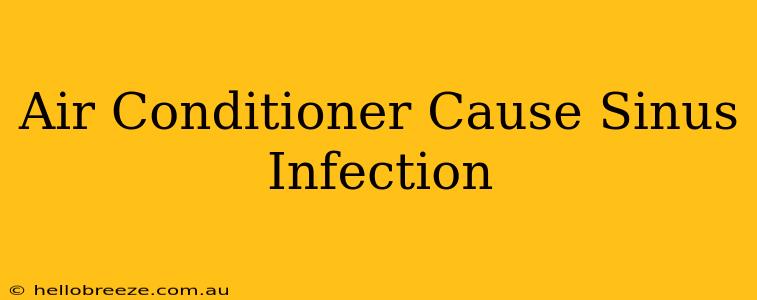Are you suffering from a sinus infection, and suspect your air conditioner might be to blame? Many people wonder if their AC unit could be contributing to their stuffy nose and headaches. While an air conditioner itself doesn't directly cause a sinus infection, it can certainly create an environment that makes you more susceptible. Let's explore the connection between air conditioners and sinus problems.
How Air Conditioners Can Aggravate Sinus Issues
Air conditioners, while essential for comfort, can negatively impact your sinus health in several ways:
1. Dry Air:
This is perhaps the biggest culprit. Air conditioners work by removing moisture from the air. Dry air irritates the delicate membranes lining your nasal passages, leading to dryness, inflammation, and increased susceptibility to infection. This dryness can thicken mucus, making it harder to clear from your sinuses, potentially trapping bacteria and viruses.
2. Temperature Fluctuations:
Rapid changes in temperature, particularly when moving between a heavily air-conditioned space and the outdoors, can shock your system. This temperature shock can stress your body and weaken your immune system, making you more vulnerable to illness, including sinus infections. Temperature changes can also trigger inflammation in the nasal passages.
3. Poor Air Quality:
If your air conditioner's filter is dirty or clogged, it won't effectively remove dust, pollen, mold spores, and other allergens from the air. These irritants can exacerbate existing sinus conditions and even trigger infections. Poor air filtration is a significant factor in worsening sinus symptoms. Regular filter changes are crucial.
4. Mold and Bacteria Growth:
A poorly maintained air conditioner can become a breeding ground for mold and bacteria. These microorganisms can be circulated throughout your home, increasing your risk of respiratory infections, including sinus infections. Regular maintenance is vital to prevent this.
5. Air Circulation:
While AC units circulate air, they don't always circulate it effectively. Stagnant air can trap irritants and allergens, contributing to sinus problems. Consider improving air circulation with fans, especially in rooms with limited natural ventilation.
Protecting Yourself from AC-Related Sinus Problems
Fortunately, there are steps you can take to minimize the impact of air conditioning on your sinuses:
- Maintain proper humidity: Use a humidifier to add moisture to the air, especially in dry climates or during winter months.
- Change your air conditioner filter regularly: Follow the manufacturer's recommendations for filter changes to ensure optimal air quality.
- Clean your air conditioner regularly: Schedule professional maintenance to prevent mold and bacteria growth.
- Minimize temperature fluctuations: Avoid drastic temperature swings between indoor and outdoor environments.
- Drink plenty of fluids: Staying hydrated helps thin mucus and makes it easier to clear from your sinuses.
- Use a saline nasal spray: This can help rinse irritants and allergens from your nasal passages.
- Consider an air purifier: An air purifier can help remove additional allergens and pollutants from the air.
When to See a Doctor
If your sinus symptoms persist despite these measures, or if they become severe (e.g., severe pain, high fever, green or yellow mucus), it's crucial to seek medical attention. A doctor can diagnose the cause of your sinus problems and recommend appropriate treatment.
Disclaimer: This article is for informational purposes only and does not constitute medical advice. Always consult a healthcare professional for any health concerns or before making any decisions related to your health or treatment.

